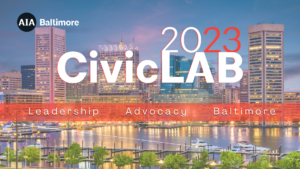Baltimore, MD (March 14, 2018) – AIA Baltimore has submitted testimony to the Baltimore City Council Land Use & Transportation Committee in support of Bill 17-0102 – Complete Streets. The bill, introduced to the city council by Councilman Ryan Dorsey, will place into law best practices for designing streets for all users, promoting safety, equity, sustainability, and overall livability. The hearing is scheduled for April 25, 5:00 pm at City Hall.
Learn more about the Complete Streets Bill.
AIA Batimore’s advocacy for complete streets is led by our members serving on the AIA Baltimore Committee on the Environment and Resiliency (COTE | R).
Bill: Baltimore City Council Bill 17-0102 – Complete Streets
Committee: Land Use & Transportation Committee
Position: SUPPORT
Date: March 14, 2018
Dear Land Use & Transportation Committee Members:
On behalf of the Baltimore Chapter of the American Institute of Architects (AIA Baltimore) and its 1,300 members representing architects, design professionals, and allied organizations in related engineering and construction fields, I thank you for the opportunity to provide testimony in support of Bill 17-0102, Complete Streets, now before the Land Use & Transportation Committee.
Equity is integral to complete streets. Everyone deserves safe, comfortable, and convenient access to community destinations, jobs, and public places. Complete streets ensure that investment is prioritized in neighborhoods where the majority of residents lack access to a vehicle and where median household income is below the city average. A network of connected facilities that improve mobility and quality of life for all will create safer streets for children, improve access to jobs, and transform the street into an extension of the community.
Streets comprise a significant percentage of city-owned land, offering a unique opportunity to incorporate elements that will not only make our streets more accessible, but protect the environment, improve community health and safety, and promote prosperity. As an architect, I know the tremendous value of an integrated design process that brings together people and place. By looking at streets holistically through a complete streets policy, improvements will be more cost effective, providing added value and avoiding expensive changes after construction. Complete streets also ensure that streets are safe for people of all ages and abilities, balance the needs of different modes of transportation, and support local land uses, economies, cultures, and natural environments.
Complete streets will make Baltimore more sustainable and resilient. In addition to reducing reliance on cars, therefore reducing CO2 emissions, complete streets benefit the environment by addressing issues such as stormwater management and urban heat island mitigation. Applied citywide, landscaping elements that help curb stormwater runoff are mutually beneficial for mobility and ecology. When redesigning streets, additional plants and trees can be incorporated to clean runoff and manage stormwater onsite. Traffic calming elements, like islands and curb extensions, provide opportunities for bioswales, rain gardens, and street trees that provide shade and oxygen, absorb CO2, and beautify communities. Such green elements are also increasingly found to be important deterrents of vehicle accidents and injuries, and contribute to a more comfortable and visually interesting environment for all users.
A complete streets policy will complement current City policies including:
- Green Network
- Bike sharing
- Climate Action Plan
- Bike lane network expansion
- Green Building Code
- Tree Baltimore
Bill 17-0102 is an opportunity for Baltimore to lead the way in best urban design practices. It will be a leap forward towards an interconnected city that promotes equity, prosperity, public health, safety, and overall livability.
Sincerely,

Ann Powell, AIA
2018 AIA Baltimore President

